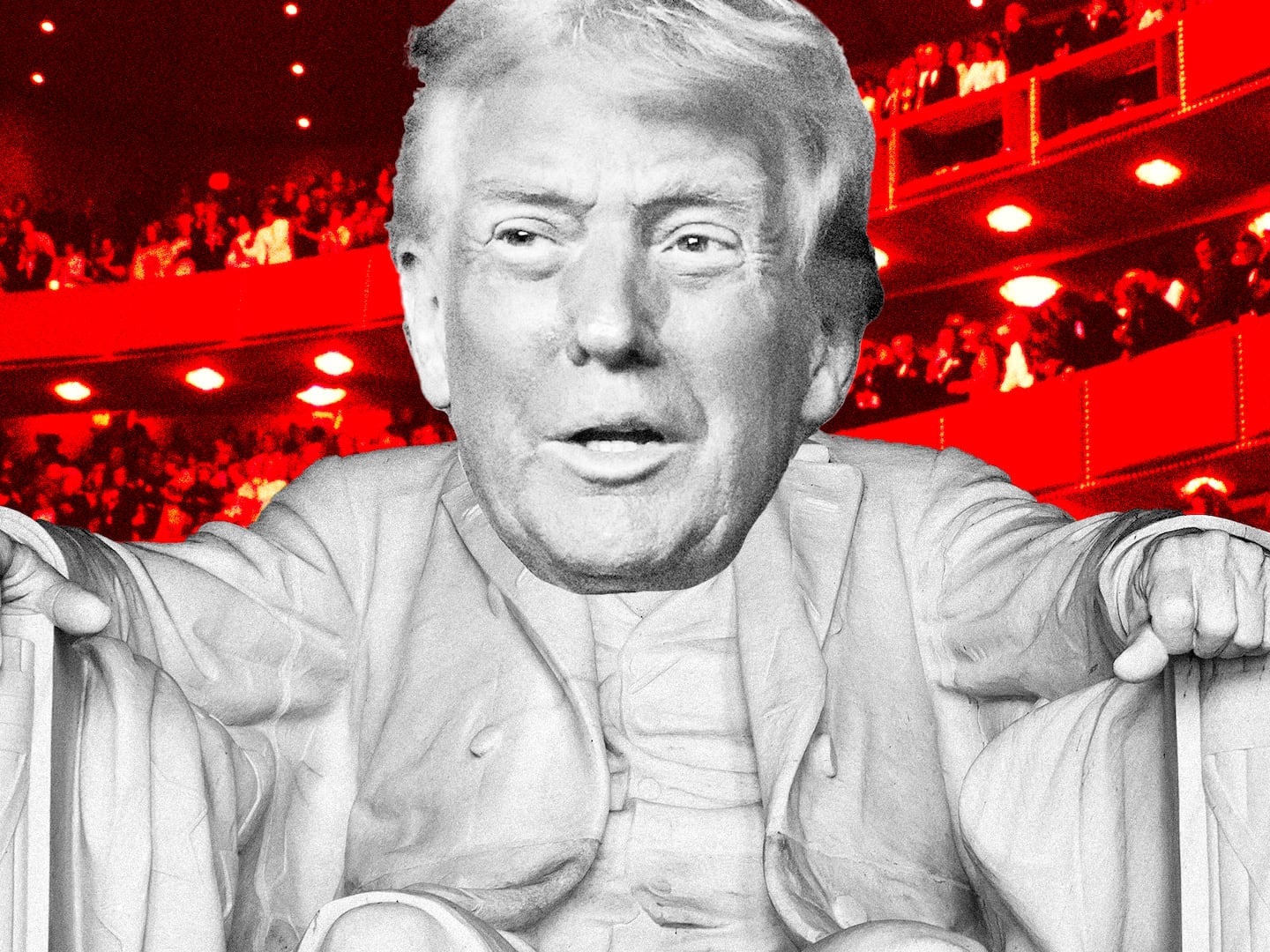
On December 6, Barack Obama announced his intention to fund a massive public works program of somewhere between $400 and $700 billion which will create enough jobs to avert the economic catastrophe of the 1930s. But I fear that one element in Obama’s well-intentioned infrastructure plan—his goal of providing all Americans with broadband Internet access—might one day be seen as inadvertently laying the foundations for a return to fascism, the political catastrophe of the 1930’s.
In the Europe of the 1930s, representative democracy’s abject failure to confront the rage of mass unemployment and dislocation led to the rise of fascist organizations such as the Spanish Falangists, the German National Socialists, and the Romanian Iron Guard. What the interwar fascists provided—with their messianic leaders, their torchlight parades, their xenophobic propaganda—was a placebo to the hopelessness that had enveloped ordinary people’s lives.
Imagine the FDR-baiting, Hitler-loving Father Charles Coughlin, equipped with his “personalized” YouTube channel, able, at a click of a button, to distribute his racist message to the suffering masses.
The 1930s fascists were expert at using all the most technologically sophisticated communications technologies—the cinema, radio, newspapers, advertising—to spew their destructive, hate-filled message. What they excelled at was removing the the traditional middlemen like religion, media, and politics, and using these modern technologies of mass communications to speak with reassuring familiarity to the disorientated masses.
Imagine if today’s radically unregulated Internet, with its absence of fact checkers and editorial gatekeepers, had existed back then. Imagine that universal broadband had been available to enable the unemployed to read the latest conspiracy theories about the Great Crash on the blogosphere. Imagine the FDR-baiting, Hitler-loving Father Charles Coughlin, equipped with his “personalized” YouTube channel, able, at a click of a button, to distribute his racist message to the suffering masses. Or imagine a marketing genius like the Nazi chief propagandist Josef Goebbels managing a viral social network of anti-Semites which could coordinate local meet-ups to assault Jews and Communists.
Now fast forward to the digital world of 2008 and what even the normally cheerful Economist has predicted will be a “ long and deep recession”. Like in the 30s, we are faced with a systemic crisis not only to free market capitalism but also possibly to representative democracy. The 2008 economic meltdown is beginning to rival the 1929 Great Crash for its catastrophic impact on the lives of ordinary people. The United Nations has described today’s world economy as the “weakest since the ‘30s”. And 2009 promises to be worse, much much worse, with the U.N. predicting that the entire world economy will actually contract for the first time since those bygone days, and Princeton’s Nobel prizewinning economist Paul Krugman forecasting that American unemployment may rise to the “ double digits”.
In the Thirties, mass unemployment lead to the catastrophe of fascism; in today’s crisis, I fear that it will lead to digital fascism.
Even before the October crash, Americans had become ever-increasingly suspicious to all institutional forms of authority—from traditional political parties to mainstream media organizations to Wall Street executives, educators, and lawyers. As Harvard University's Center for Public Leadership reported late last month, 80 percent of Americans believe there is a leadership crisis in the country. And that research was conducted in the fall—before AIG, before Lehmann Brothers, before the public humiliation of Detroit’s elites.
The phenomenal popularity of the personalized, democratized Internet, the zeitgeist of our age, is both a cause and a consequence of our suspicion with all forms of institutional authority. That’s fine, of course, in an age of prosperity when everyone has a job; it’s great in an age of “yes we can” optimism when an army of grassroots activists can use the Internet to elect a young politician of infinite hopefulness. But, as the nightmarish implications of the 2008 crash unfold, I fear that giving broadband Internet access to the innocent victims of global economic might have disastrous unintentional consequences. In 2008, the Internet elected Barack Obama; in 2012, in an America with 15 percent or 20 percent unemployment, I doubt that the digital crowd will be quite as wise.
The question is: In our democratized world of individual empowerment, how will the newly unemployed millions, the victims of the meltdown, react to their economic disempowerment? In a culture that prioritizes the personal, how will the masses vent their rage against a system that no longer personally works for them?
Even today, the Internet’s unholy synthesis of immediacy, intimacy and anonymity has created an online culture of insult and vulgarity. The unedited Internet is the natural home of racists, liars, hate-mongers, and raving lunatics. Take, for example, the massive Internet popularity of Loose Change, the vindictive movie which, in its absurd conspiracy theory that explains 9/11 as a Bush-Cheney plot, is about as empirically credible as The Protocols of the Elders of Zion, the granddaddy of all fascist conspiracy texts.
In an America with universal broadband access and 50 million unemployed people, expect the biggest online hit to be a mash-up of Loose Change and The Protocols of the Elders of Zion—an “innovative” low budget movie blaming the entire global financial meltdown on all the (Robert) Rubins and (Larry) Summers of Wall Street.
Silicon Valley utopians argue that blaming the Internet for online hatred is like blaming Johannes Gutenberg, the 15th century inventor of the moveable type printing press, for Mein Kampf. And that’s true, of course. Yet given the way in which we know that the unfiltered Internet spreads corrosive lies and inflames prejudice, why would we want to give all Americans universal broadband access at the very moment when millions of them will be unemployed, disorientated and angry? Rather than spending billions of dollars in telecom technology, wouldn’t it be better to invest that money in local libraries and librarians, where their education could be supervised by accountable human beings.
For another sneak preview of digital fascism, it’s worth looking at South Korea, another country with universal broadband infrastructure. In April, the new democratically elected South Korean President, Lee Myung Bak lifted a ban on imported American beef. This resulted in an eruption of anger on the Internet—first amongst teenage girls, then on the popular online portal Daum, and finally through teenage "citizen journalists" on blogs, videocasts, and social networks. The rumor spread that all the American beef was tainted with mad cow disease and an online petition for Lee’s impeachment got 1.3 million signatures in a week. And for an even more real-time example of digital fascism, take a look at the way in which this week’s raging anti government violence in Greece by the young and unemployed (already at over 9% in the Greek economy) has been coordinated by Facebook, Twitter and other viral digital networks.
The fascists of the 1930s were able to take advantage of the yawning gap between individual expectations and the harsh realities of the global economic system. As the nightmare of the 2008 economic meltdown unfolds, I fear the reappearance of that unbridgeable gap between expectations and reality. We live in an increasingly democratized culture in which individuals, tragically, have less and less control over their own economic lives. The Internet—in its seductive promise of personal empowerment—only compounds this illusion. In his speech earlier this month, Obama said, “here in the country that invented the Internet, every child should have the chance to get online.” If only enlightenment was that simple.
Andrew Keen is the author of the controversial international hit Cult of the Amateur, which has been translated into 15 foreign languages. Known as the Anti-Christ of Silicon Valley, he is the most hated person on the Internet. He twitters at @ ajkeen.com.






